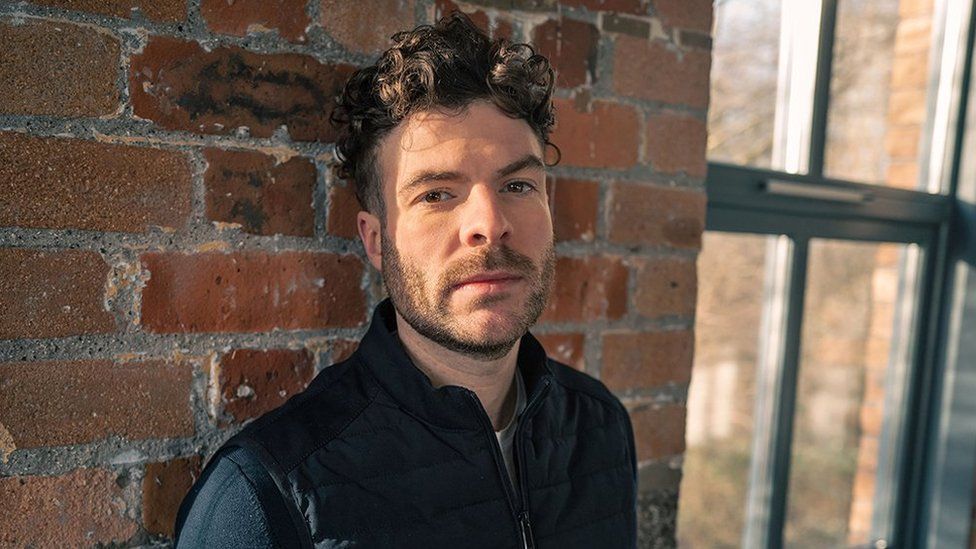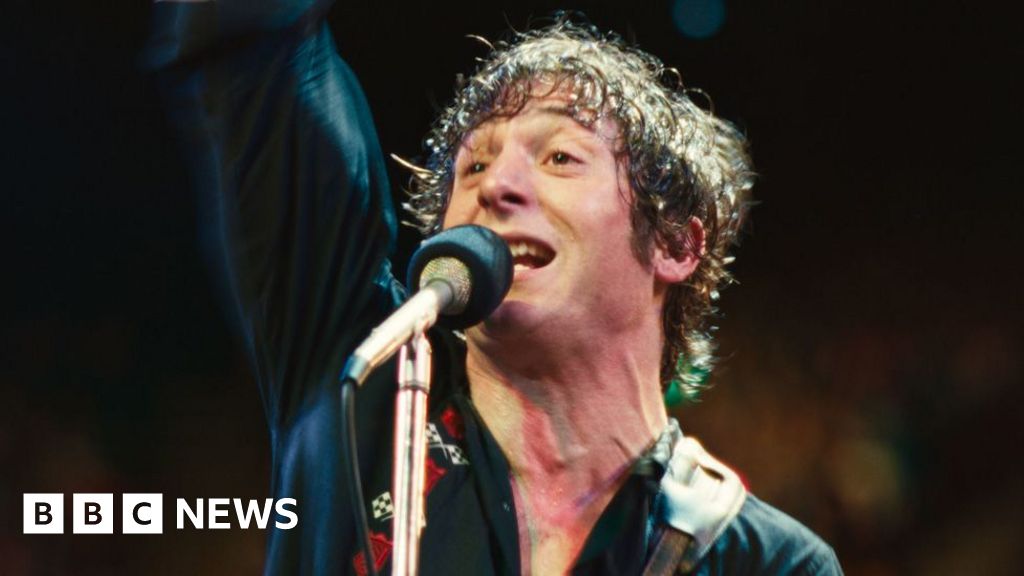ARTICLE AD BOX

Jordan North took up vaping in order to quit cigarettes
Presenter and podcaster Jordan North started vaping to try to give up cigarettes. He found himself reliant on both - and wasn't happy. Confused by conflicting reports about the potential harms of vaping, he has been looking at the evidence himself for a BBC Three documentary.
I hate to admit it, but I started smoking when I was 16.
I tried so many times to quit - and failed - but found that switching to vapes really helped me cut down.
But it soon got to the stage where I was vaping way more in a day than I was smoking the cigs.
Now I wonder - have I just swapped one bad habit for another?
The number of people vaping in Britain has tripled in 10 years, charity Action on Smoking and Health estimates.
Health experts largely agree that vapes - or e-cigarettes - are a good way to wean adults off smoking because there are fewer toxins in vapes than in tobacco smoke.
Jordan North sets out to decide, once and for all, if it's time he quit vaping.
But many young people are bypassing cigarettes and going straight to vaping.
One survey of 18-24 year-olds who use disposable vapes suggests about half have never smoked cigarettes. I think a lot of them probably think vaping is pretty harmless - just like I did.
I have a few friends who have never smoked but now vape - and they say they are addicted. That's something that started to concern me too.
What's inside a vape?
I really wanted to get to the bottom of the effects of vaping on my health - and find out what's actually inside these little plastic things.
So I paid a visit to the University of Sunderland, where I got my degree. There I met Dr Stephen Childs, who is doing loads of research on vapes.
I brought along some legal disposable vapes and he pulled them apart in front of me.
The smell of the liquid was incredibly strong. I was a bit afraid to hear what would be inside them, but knew I needed to know.
Taking vapes apart with Dr Stephen Childs at Sunderland University
Dr Childs told me that the vapour inhaled from a vape contains nicotine, which is addictive, as well as a small amount of other chemicals used for flavour enhancement.
The e-liquid inside vapes also includes the kinds of additives commonly found in processed foods such as sauces and cake mixes. They are safe to eat, but what happens if you're inhaling them?
"There are some short-term studies which suggest that there might be things like inflammation in the lungs caused by inhaling these types of [additives] chemicals," Dr Childs tells me.
Illegal vapes
In the UK, disposable vapes have to follow lots of regulations - the nicotine content can't be higher than 2%, which is about 20-40 cigarettes-worth.
But when we visited shops selling vapes and looked online, we found examples of illegal ones containing 10 times that amount.
Dr Childs told me that even legal vapes contain thousands of chemicals that aren't listed on the packaging. It's not against the law to do this, but I still felt duped.
A third of vapes on the market in the UK are likely to be illegal versions, the Chartered Trading Standard Institute estimates.
But it can be really hard to tell which ones are compliant by looking at the packaging - and we found dodgy versions for sale in a number of High Street shops.
Here are some things to look out for:
- UK regulations state disposable vapes must not contain more than 2ml of e-liquid, which amounts to about 600 puffs. So if is bigger than that, it's likely to be illegal
- How big are the health warnings? They should cover about a third of the packaging, and the words "This product contains nicotine which is a highly addictive substance" should be displayed on the front and back
- What level of nicotine content does it advertise? The limit for legal disposable vapes is 2%
More and more young people are taking up vaping
'Toxic chemical'
To find out more about the illegal market, I visited the Inter Scientific laboratory in Liverpool, which tests thousands of illegal vapes seized from across England.
Out of a recent sample of 24 vapes that the lab looked at this year, nearly a third contained lead.
It's a toxic chemical and the World Health Organization says high levels of exposure in young people can affect brain development.
I also learned that almost 90% of the samples contained high levels of nickel. This is a metal, found in coins or electrics, and prolonged exposure can be harmful to your health.
In addition, lab tests found compounds called carbonyls. When the e-liquid heats up, these break down into chemicals such as formaldehyde and acetaldehyde. These are potentially carcinogenic substances - in other words, they could cause cancer.
To cap it all, about a third of these vapes claimed to be free from nicotine, but weren't.
We don't know where these illegal vapes were made - there's no UK authority keeping tabs on how they are being produced.
Raids
So who is in charge here? In England and Wales, Trading Standards - a watchdog for illegal or unfair business dealings - can visit shops and seize illegal vapes. Scotland and Northern Ireland have their own teams.
I spent a day with Trading Standards officers in Newcastle as they raided shops.
Some shop owners were crafty and had vapes in a back room, but in other stores they were out on display. The Trading Standards officers seized about 1,000 vapes that day.
On patrol with Trading Standards officers in Newcastle
But the number of businesses actually being prosecuted for selling illegal vapes appears to be very low.
Our team contacted 100 councils, and 80 responded. They said that about 2,200 businesses were found to be selling illegal vapes in 2023.
Of those businesses, Trading Standards recommended fewer than one in 20 for prosecution.
In January, the UK government said it was going to ban disposable vapes in order to tackle a rise in youth vaping. It also said it would give Trading Standards the power to issue fines on the spot for people found selling the illegal products.
Non-disposable vapes will remain legal, but a tax on vapes was introduced in the Budget earlier this month.
But if we ban disposables, we also need to get the dodgy ones off the street, otherwise people might just turn to those instead.
Breathing difficulties
Scientists continue to look into the potential health risks of vaping but say knowing their long-term effects could take decades.
So while we wait for more information, how am I supposed to decide whether to stick with vapes or not?
Meeting Jemma in Essex was the moment I decided I didn't want to smoke vapes anymore.
The 34-year-old has used both legal and illegal vapes regularly for 10 years.
She was a light smoker who first turned to vaping to get off the cigs. But then it became a problem of its own.
"I was vaping all day, everyday - in the car, first thing in the morning," she tells me.
"I'd be thinking: 'Right where's my vape?'"
Jemma has been diagnosed with a lung condition that may be connected to her vape use
Unfortunately, last year doctors diagnosed Jemma with COPD - a serious lung condition that causes breathing difficulties.
It is rare for someone so young. We don't know for sure - but her doctor thinks it could be down to her years of vaping.
She really struggles some days and has been told she has a reduced life expectancy.
"It's basically a terminal illness," she says. "But it doesn't mean that you're gonna die within the next year. I could live up to 20 years."
After hearing Jemma's story, I've realised I can't swap one addiction for another.
I can see there's still a lot of unknowns. Yes, vapes may be better than cigarettes, but we still can't be sure how they affect our health.
The risks feel pretty real for me right now though, so I think overall it's probably better for me to just pack them in. Since filming the documentary, I'm proud to say I haven't touched a vape.

 1 year ago
56
1 year ago
56








 English (US) ·
English (US) ·